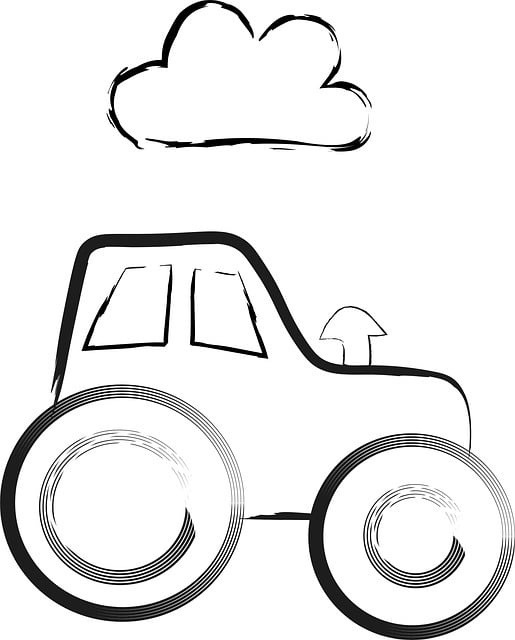When your lawn tractor shows signs of starting difficulties, such as slow cranking or the need for multiple attempts to start, it's likely that your lawn tractor battery is degrading. A healthy battery is essential for providing the necessary power to start the engine efficiently. Over time, batteries naturally lose their ability to hold a charge, which can manifest as reduced starting performance and a sluggish response when you engage the start mechanism. To maintain your battery's health, it's important to perform regular maintenance like cleaning the terminals and checking electrolyte levels. If these issues persist, it might be time to replace your lawn tractor battery to prevent more significant problems that could affect the tractor's operation.
If your lawn tractor's headlights are dim or not working properly, it's a clear indication that your battery needs attention. This is often due to sulfation, where sulfuric acid crystallizes on the lead plates, reducing the battery's capacity to hold a charge. Such degradation can cause lights to flicker or fail after a short period, indicating increased internal resistance, which is a warning sign of an impending battery failure. Proactive maintenance and regular checks can help mitigate these issues, ensuring consistent and reliable lighting for your lawn care activities and prolonging the battery's lifespan.
Watch out for other signs of a declining battery performance, such as malfunctions in gauges and accessories, like erratic charging indicator lights or dim headlights. These issues, stemming from the battery's reduced charge capacity, can lead to frequent recharging, potentially causing stress on other electrical components, which could fail if the battery problem isn't addressed. Prompt replacement of a failing battery is crucial for preventing unexpected breakdowns and ensuring consistent, safe operation of your lawn tractor.
If you notice that your lawn tractor's ignition system is unresponsive or the key feels weak when trying to start the tractor, it's a sign that your battery's performance is on the decline. Use a multimeter to measure its voltage; if it's below the required threshold for optimal functionality, it's time to replace the battery. Regular monitoring and timely maintenance can help prevent such failures and ensure your lawn tractor remains reliable for all your yard maintenance tasks.
For those experiencing reduced performance from their lawn tractor's mowers or attachments, a weak or aging battery could be the culprit. A deteriorating battery can cause motors to struggle under load or fail to start altogether. It's important to monitor the battery's voltage regularly, as consistently low readings are a definitive signal that it's time for a replacement. Early detection and replacement of your lawn tractor battery will help safeguard against more severe malfunctions and ensure optimal performance for a beautifully manicured lawn.
When your trusty lawn tractor seems less reliable than usual, it might be time to assess the health of its battery. A failing tractor battery can manifest in several ways, from a sluggish engine start to weak power for attachments like mowers. This article outlines seven clear indicators that your lawn tractor battery is on its last legs, enabling you to address the issue promptly and keep your outdoor maintenance tasks running smoothly. Recognizing these signs—from dim headlights to audible noise during operation—can save you from unexpected stalls and ensure your equipment operates at peak performance. Understanding these signals is key to maintaining your tractor’s efficiency and longevity, so let’s explore the telltale signs that it’s time for a new battery.
- Sluggish Engine Start: A Decline in Cranking Power
- Dim or Non-Functional Headlights: Light Output Issues
- Struggling Electrical Components: Gauges and Accessories Malfunctioning
- Unresponsive Ignition: Key Won't Turn with Ease
- Frequent Electrolyte Leaks: Checking Fluid Levels for Maintenance and Safety
- Weak Power to Attachments: Noticeable Drop in Performance with Mowers or Other Tools
Sluggish Engine Start: A Decline in Cranking Power

When you notice your lawn tractor’s engine cranks slowly or requires several attempts to start, it may be a sign that your tractor battery is on the verge of failure. A healthy battery should provide ample cranking power to fire up the engine with ease. However, as batteries age, they lose their ability to hold a charge as effectively, which can manifest as a noticeable decline in the engine’s starting performance. This diminished cranking power is often accompanied by a sluggish response when you turn the key or press the start button. It’s advisable to monitor this behavior and consider replacing your lawn tractor battery if you consistently experience these issues, as a weak battery can lead to incomplete engine starts and may prevent the tractor from operating at all. Regular maintenance, including keeping the terminals clean and checking the electrolyte levels, can help prolong the life of your battery and ensure it performs optimally throughout its lifespan. If you suspect your lawn tractor battery is failing due to sluggish engine starts or a decline in cranking power, address the issue promptly to maintain the reliability and efficiency of your equipment.
Dim or Non-Functional Headlights: Light Output Issues

When your lawn tractor’s headlights dim or cease to function properly, it can be a clear indicator that your tractor battery is on its way out. A consistently weak light output, especially when compared to its usual performance, suggests that the battery is struggling to hold a charge. Over time, batteries naturally degrade due to sulfation, which is the crystallization of sulfuric acid around the lead plates. This process reduces the battery’s ability to store energy, leading to diminished headlight brightness. Additionally, if the lights flicker or go out after a short period of use, this is a sign that the internal resistance of the battery has increased, another symptom of battery failure. Regularly inspecting your lawn tractor battery and monitoring its light output can help you identify these issues early, ensuring you have reliable illumination when operating your tractor in low-light conditions. Maintaining proper charging practices and keeping the terminals clean and free from corrosion are preventive measures that can extend the life of your lawn tractor battery and avoid unexpected failures while working on your lawn or garden.
Struggling Electrical Components: Gauges and Accessories Malfunctioning

When your lawn tractor battery starts to wane, it can manifest in several ways, particularly with the electrical components connected to it. One noticeable sign is when gauges and accessories begin to malfunction. The battery powers various elements of your tractor, from headlights to voltage meters and electrically driven attachments. As the battery’s charge diminishes, these components may not function as reliably as they once did. For instance, the charging indicator might flash erratically or fail to turn on altogether. Similarly, if you notice that your tractor’s lights are flickering or not illuminating as brightly as usual, this could be a sign that the battery’s capacity is decreasing. Another symptom is when the battery struggles to hold a charge for an extended period, leading to frequent recharging. This pattern of inconsistent power supply can strain other electrical components, causing them to function improperly and eventually fail if the underlying battery issue remains unaddressed. It’s crucial to monitor these signs closely as they can indicate that it’s time to replace your lawn tractor battery with a new one to maintain optimal performance and safety while operating your equipment. Regular maintenance and timely replacement of your lawn tractor battery can prevent unexpected breakdowns and ensure smooth operation during your gardening tasks.
Unresponsive Ignition: Key Won't Turn with Ease

When you go to start your lawn tractor and turn the key, but the ignition system remains unresponsive, it could be a sign that your tractor battery is on its way out. If you’re experiencing difficulty with the ignition—the key won’t turn as easily as it once did—it’s likely due to a weakened battery. This issue often manifests when the battery’s charge capacity diminishes, making it harder for the electrical system to engage the starter motor. The battery may still hold some charge, but not enough to deliver the necessary current. Regular maintenance, including keeping the terminals clean and ensuring the battery is securely fastened, can sometimes alleviate temporary issues. However, if this problem persists, it’s a clear indication that your lawn tractor battery’s performance is declining. It’s advisable to test the battery with a multimeter to confirm its state of health and consider replacing it if it falls below the recommended voltage for optimal performance of your lawn tractor. Regular checks and proactive maintenance can prevent such occurrences, ensuring your tractor remains reliable for all your yard work needs.
Frequent Electrolyte Leaks: Checking Fluid Levels for Maintenance and Safety

When managing a lawn tractor battery, it’s crucial to stay vigilant for signs of impending failure. One such indicator is the occurrence of frequent electrolyte leaks, which can compromise both the battery’s performance and your safety. The electrolyte in a lead-acid battery, such as those commonly used in lawn tractors, is a corrosive mixture that should be contained within the battery casing. If you notice a persistent leak around the battery case or on the ground where the tractor has been operating, it’s a clear signal that the integrity of the battery is compromised. To address this issue, regularly inspect the battery for any signs of cracks or damage to the casing, which could be the source of the leakage. Ensure that the battery connections are clean and secure to prevent spills from loose terminals. Checking the fluid levels is a routine maintenance task that can help you catch electrolyte leaks early on. Use a clean cloth to wipe away any residue and check the electrolyte level through the vents or sight glass, being careful not to overfill or underfill the battery. Proper electrolyte levels are essential for optimal battery function and can extend the life of your lawn tractor battery significantly. If you do discover a leak, it’s imperative to take immediate action. Remove the battery from the tractor and clean up any spilled electrolyte with a solution of baking soda and water to neutralize it. Dispose of the neutralized electrolyte responsibly, following local regulations for hazardous waste disposal. In some cases, sealing the leak with an epoxy repair kit may be sufficient, but if the battery is old or damaged beyond repair, replacing it with a new one is the best course of action to ensure continued safe and efficient operation of your lawn tractor. Regular monitoring and prompt attention to any leaks can prevent more serious issues and keep your lawn tractor battery functioning reliably.
Weak Power to Attachments: Noticeable Drop in Performance with Mowers or Other Tools

When you notice a marked decrease in the performance of your mowers or other attachments while using your lawn tractor, it may be an indicator that your battery is on its way out. A weak battery can result in a sluggish response from your equipment, leading to a noticeable drop in cutting efficiency or other functionalities. This decline in power output isn’t just frustrating but can also affect the quality of your lawn care tasks. The battery is the heart of your lawn tractor’s electrical system, and as it ages, its ability to supply consistent voltage diminishes. This can cause the motor to struggle, especially when under load, or fail to start altogether. Regularly check the voltage with a multimeter; if it’s consistently low, it’s a clear sign that your lawn tractor battery may need replacing. Paying attention to these early warnings can prevent more significant issues down the line and ensure that your lawn tractor operates at its best, maintaining a well-groomed landscape.
When tending to your lawn or farming duties, a reliable tractor is indispensable. However, if you’re noticing sluggish engine starts, dim headlights, or struggling electrical components, it may be time to assess your lawn tractor battery. These signs, including unresponsive ignitions, frequent leaks, and weak power to attachments, often indicate a failing battery that requires attention. Regular maintenance and prompt replacement of your lawn tractor battery can ensure your equipment operates smoothly and safely. Stay vigilant and proactive in monitoring your tractor’s battery health to maintain peak performance and avoid unexpected disruptions to your outdoor tasks.



